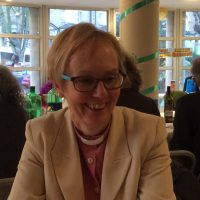Listen to Sunday Worship which celebrated the centenary of the ordination of Congregationalist Minister, Constance Coltman, the first woman to be ordained to ministry in any mainstream church in Britain.
Also to Daily Service, with Dr Janet Wootton on the same theme.
Read about a celebration weekend of events.
And (quite literally) buy the T-shirt at the URC shop!
Revd. Sue Mccoan says:
Today we celebrate the 100th anniversary of the ordination of Constance Coltman, the first woman to be ordained in a mainstream denomination in Britain. She was ordained into the Congregational Church, which then became part of the United Reformed Church, so we can claim her as our own.
She was born Constance Todd, in 1889, in Putney, not far from here. The eldest of 4 children, she enjoyed a privileged upbringing, not least the privilege of education. She went to a private all-girls’ school from where she won an exhibition to read History at Oxford. Women in those days, 1908-11, could study there but they had to ask permission to attend lectures and were still not able to be awarded degrees – that didn’t happen till 1920. Without a degree, it was almost impossible to enter the professions. There were a tiny number of women doctors, and in 1910 the first female accountants, but no women diplomats, barristers or architects – or church ministers.
Yet Constance felt God was calling her to ministry. As she was in Oxford, she approached the principal of Mansfield College, Dr Selbie, and asked if he would accept her for ministerial training. In a long and searching interview, Dr Selbie kept in mind the question, ‘if I had a male candidate with these abilities, with this sense of call, would I take him on?’ The answer was yes, so he agreed to accept Constance – with the proviso, still given to students training for URC ministry today, that being trained did not guarantee being called to a church.
Constance and her fiancé, fellow student Claud Coltman, were ordained as ministers on 17th September 1917. The following day they were married. It mattered to them both to do things that way round, so that Constance was seen to be ordained in her own right and not as some kind of auxiliary to her husband. They shared their ministry together, serving in deprived areas, then Oxford, where Constance had 3 children; they raised a family; Constance supported young mothers and other women in ministry, as well as being a founder member of Christian CND. When she retired she learnt Swedish so she could support women seeking ordination in the church of Sweden. What a woman!






